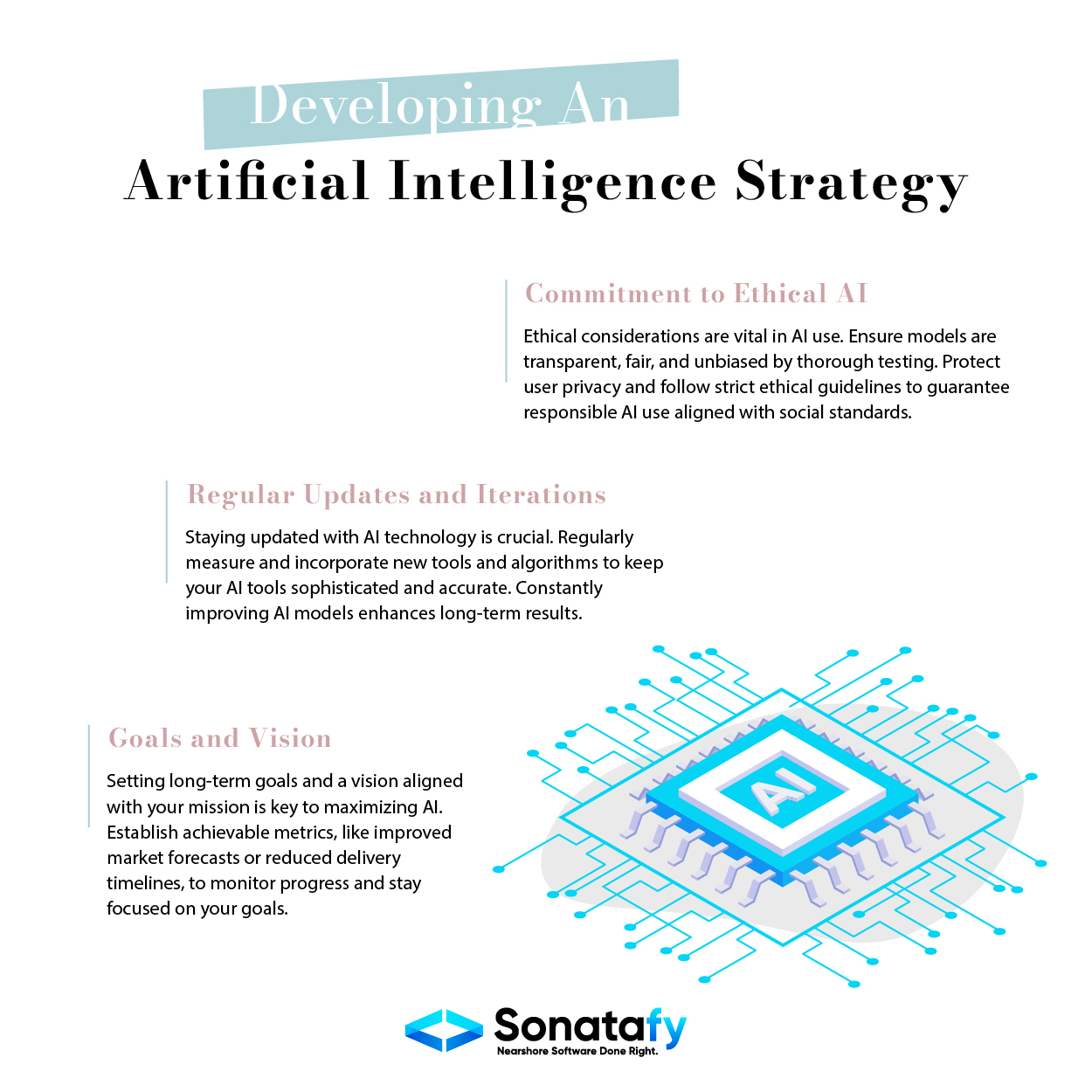An elaborate strategy is necessary for companies to be successful in software development. Intelligence powered by AI is changing the landscape by improving planning accuracy, efficiency, and insight. AI can improve decision-making, inspire creativity, and transform systems. Let’s explore how AI-driven insights disrupt process management in the software development industry.
AI in Strategic Planning
Being a science fiction concept, artificial intelligence (AI) has become an essential tool for software companies. AI systems analyze vast amounts of data, identify trends, and provide previously impossible insights. With AI, companies can predict market trends, use resources better, and reduce risks accurately.
Predictive Analytics for Market Trends
To stay ahead, software engineers need to keep up with market trends. AI-powered predictive analytics uses machine learning and past data to predict future market trends. This helps companies anticipate customer desires, identify emerging technologies, and adapt strategies.
Resource Optimization
Resource management is essential to the success of software development. AI-powered insights can help us use our resources, people, money, and technology better. Using machine learning, we can consider project needs, team capabilities, and budget constraints to decide the best way to allocate resources. This increases productivity and assures that projects will be completed on time and within budget.
Risk Prevention
While risk is inevitable in business, software development presents unique implementation challenges. Projects in this industry can require a lot of uncertainty and variability. AI can quickly identify potential risks by analyzing historical project data, current market conditions, and geopolitical changes. By taking proactive positions, companies can mitigate issues through backup programs, new resource allocations, and smart decisions.
AI to Improve Decision-Making
AI transforms data into useful information to help managers make better decisions. This leads to smarter choices that help businesses grow and develop new ideas.
Decision-Making Based on Data
Traditional decision-making often depends on intuition and experience, which can be biased. On the other hand, AI reduces subjectivity by providing recommendations based on data. For example, AI can help in the decision-making process of product development by analyzing feature usage statistics, problem reports, and user feedback. By doing this, development efforts align with user needs and market demand, gradually increasing customer happiness and corporate success.
Scenario Analysis
AI lets you explore different scenarios to see how choices might play out. This helps you determine what might happen if you adopt a new technology, enter a new market, or change development methods. Knowing the potential risk benefits from these situations allows companies to make informed decisions.
Continuous Improvement
The big advantage of AI is that it is constantly improving. Machine learning models become better and more reliable as more data is processed. AI tools are helpful in strategic planning because they can identify risks, maximize resources, and predict trends. Because of this continuous improvement, the operating system is flexible and can change as the market evolves.
Implementing AI in Strategic Planning
While there are many clear benefits to using AI for analytics, strategic planning must be done when using AI. These initiatives include selecting appropriate tools, ensuring data quality, and promoting a new culture of lifelong learning.
Choosing the Right AI Tools
The software development industry offers many AI tools for strategic planning. It is crucial to select tools that align with your objectives and requirements. Consider the tool’s compatibility with other tools, its ability to adapt to your changing demands, and its ease of use. Consulting with AI specialists and conducting in-depth assessments can help you select the appropriate tools for your company.
Ensuring Data Quality
The quality of an AI depends on the data it processes. For accurate and insightful results, make sure the data is good. This includes establishing a strong data governance structure, organizing and cleansing data, and monitoring data quality regularly. AI models can improve strategic planning by providing more accurate predictions and recommendations when high-quality information is provided.
Promoting a Culture of Innovation
Integrating AI into strategic planning requires significant cultural and technological change. It encourages a new, continuous learning culture within the company. Collaboration between software engineers, data scientists, and business leaders is essential for adopting AI. Providing training and development opportunities helps ensure that staff members have the necessary skills to apply the full range of AI findings.
Developing an AI Strategy
Integrating AI into strategic planning requires a plan. It’s an ongoing process that needs a sustainable strategy. This strategy should cover long-term goals, regular updates, and a dedication to ethical AI practices.

Goals and Vision
Setting specific long-term goals and a vision supporting your organization’s mission is essential to maximizing AI. This includes establishing achievable metrics for AI integration, such as achieving more accurate forecasts in market metrics or a specific percentage reduction in work delivery timelines so companies can monitor their progress, make necessary adjustments, and focus on achieving their goals in a clear framework.
Regular Updates and Iterations
It is essential to stay up to date with AI technology. Measuring and incorporating these advancements into your planning process is important as new tools and algorithms are released regularly. Your AI tools stay sophisticated with frequent updates, giving you the most accurate insights. If AI models are constantly improved and refined, long-term results will improve.
Commitment to Ethical AI
Ethical considerations are crucial when using AI strategies. We must ensure that AI models are transparent, fair, and not biased. We must test and check them thoroughly to avoid unfair outcomes and keep user information private. If we create and obey strict ethical guidelines, we can guarantee that the use of AI is responsible and in line with social standards.
Future Trends in AI in Strategic Planning
AI, with strategic planning, has a bright future and many innovative applications. By following these trends, companies can maintain their competitive advantage.
Integration with Other Emerging Technologies
AI will start working with cool tech stuff like the Internet of Things (IoT), blockchain, and augmented reality (AR). This mix will give us new chances to collect and study data, giving us even more innovative and valuable insights. For example, IoT gadgets can provide real-time data, and AI can analyze it to improve software and user experiences.
Increased Personalization and Customization
AI can analyze much data, meaning software products and services can be more personalized and customized. By understanding what each person likes and how they behave, AI can help developers find solutions that fit their needs. This will make users happier and more loyal because the products will better match their wants.
Enhanced Collaboration and AI Democratisation
As AI tools become easier, different departments will work together more. AI, with strategic planning, has a bright future and many innovative applications.
Conclusion
AI insights are changing software development by helping companies predict market trends, assign resources more efficiently, and manage risks with previously unknown precision. Companies can use AI to gain a competitive edge in today’s marketplace to help them make smarter and more efficient decisions. The benefits of implementing AI outweigh the challenges of choosing the right technology, ensuring data quality, and establishing a new culture. In the future, artificial intelligence will be heavily influenced by policy-making regarding software development. It’s not just about competing when AI-powered insights are adopted; it will also set the standard for innovation and excellence in software development.




